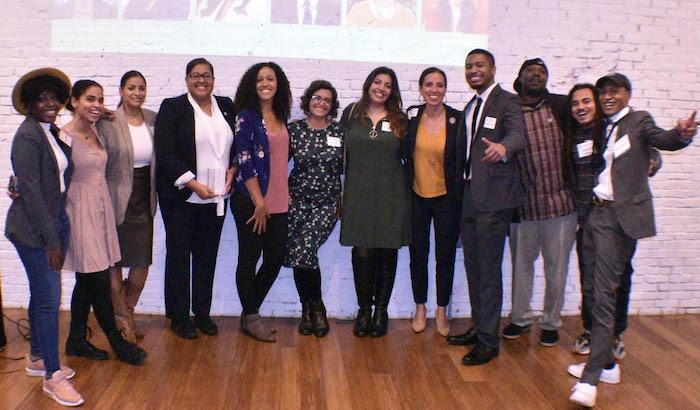
The investments and policy decisions we make now will have a lasting impact on whether we create a truly equitable industry.
The following is part of a letter written by the policy team at Equitable Opportunities Now, a nonprofit that “educates and empowers people of color to become active participants in the Massachusetts legal cannabis market,” to state lawmakers who are currently considering multiple critical cannabis bills. This part of their testimony addresses barriers to equitable participation and the promotion of businesses owned by and career pathways for justice-involved individuals. We also published EON’s research on where Mass cannabis tax revenue is going and whether the state is equitably reinvesting in communities harmed by the war on drugs here. -TJM Editors
Dear Chair Gomez, Chair Donahue, and Honorable Members of the Joint Committee on Cannabis Policy:
Thank you again for your thoughtful leadership in developing and passing “An Act Relative to Equity in the Cannabis Industry” and for the Legislature’s long-term commitment to advancing the social justice goals voters approved in legalizing cannabis through Ballot Question 4.
Thanks to your persistence and the support of Senate President Spilka, Speaker Mariano, and your colleagues, Massachusetts will, at last, join other states in distributing a small share of cannabis tax revenue back toward entrepreneurs harmed by the War on Drugs, and improve equity in municipal licensing, curb abuses of HCAs, open the door to the social consumption market, and enable people to more easily secure expungements.
This landmark law is a significant step forward in our march toward a more equitable industry, and yet Black and Brown entrepreneurs and justice-involved individuals are still falling further behind in the race to build this market.
They’ve been left behind by a policy that gave existing medical operators a first-mover advantage – effectively driving capital toward well-funded existing operators and applicants and undercutting the intended impact of priority review for Economic Empowerment applicants.
They’ve been left behind by municipal HCA negotiations that have favored large multi-state operators and those who can afford to pay top dollar.
They’ve been left behind by an increasingly saturated market during the two two-year legislative sessions it took to pass the Commonwealth’s historic new equity law.
And they will continue to be left behind as we wait for new regulations and the new cannabis social equity fund to be fully funded and online – and even after if we don’t commit to meaningful reinvestment of cannabis revenue.
As of June 8, 2023, the Cannabis Control Commission (CCC) had issued 1,478 applications, which include only:
- 108 Economic Empowerment Applicants (7.3%)
- 304 Social Equity Program Participants (20.6%)
- 232 Disadvantaged Business Enterprises (15.7%)
As time marches farther and farther away from the passage of Question 4 in 2016, the communities that voters and legislators sought to empower drift farther and farther behind, which is why we urge you to act boldly and take big strides to help equity catch up this session.
We have seen recent examples – from the COVID public health response to setting up sports betting, submarine rescues to highway repair – of what the government is capable of doing when there’s an urgent need. And right now, CCC licensing numbers highlight the urgent need for action on cannabis equity.
Black and Brown entrepreneurs can’t afford to keep waiting and falling behind. The investments and policy decisions we make now will have a lasting impact on whether we create a truly equitable industry.
We submit this testimony in support of the following bills to stress that there is an urgent need for bold leadership that will make meaningful strides in removing barriers and improving opportunities for the entrepreneurs and communities most impacted by the harms of over-policing and the War on Drugs.
We would like to thank Sen. Liz Miranda, Sen. Pat Jehlen, Sen. Jason Lewis, Rep. Chynah Tyler, and Rep. Dave Rogers for their continued commitment to creating a more equitable industry, and urge you to favorably report the following legislative agenda for cannabis equity:
- Equitably reinvesting cannabis revenue in communities harmed by the war on drugs
- Removing barriers to equitable participation in the cannabis industry
- Promoting cannabis businesses
- Creating career pathways for justice-involved individuals
Before elaborating further on the bills included in EON’s legislative agenda, we also want to acknowledge and thank Rep. Michael J. Soter, Sen. Ryan Fattman, and Stephen Mandile for their advocacy on behalf of expanding medical cannabis access to veterans and express our support for H119 and S50.
Removing Barriers to Equitable Participation
The most significant barrier for entrepreneurs seeking opportunities in the cannabis industry after access to capital is real estate. Presently, a signed lease is commonly necessary to secure a host community agreement, provisional license, and advance through the process – often resulting in months or years of burning tens or hundreds of thousands of dollars for empty space as they navigate the process.
Thankfully, state and local leaders are increasingly recognizing the inequity created by requiring a lease or letter of intent so early in the process, and the Cannabis Control Commission has already established a “pre-certification” process contemplated for social consumption licenses to provide equity applicants with some documentation about potential viability to bring to municipalities as they negotiate host community agreements.
However, further legislative clarity would be helpful to guide cities and towns toward giving fair and equitable consideration to small local businesses from disparately harmed communities that might not have the resources to pay rent on an empty building for months or years. H124 sponsored by Rep. Chynah Tyler would build on the Legislature’s mandate that the CCC provide guidance to municipalities on encouraging equitable participation in HCA negotiations to make explicitly clear that holding real estate for an unreasonably long time is not necessary for an otherwise viable applicant to advance through the early stages of the application process and greatly reduce barriers for Black and Brown businesses.
Additionally, H117 would provide a significant and long overdue new opportunity for local entrepreneurs from communities harmed by the war on drugs and open up a market that has been almost exclusively reserved for well-financed multistate operators. “An Act relative to vertical integration of medical marijuana businesses” sponsored by Rep. David M. Rogers would eliminate the requirement that medical treatment centers be vertically integrated, owning cultivation, manufacturing, and retail facilities.
While vertical integration may have played a helpful role in reducing the burden on the Department of Public Health and later the CCC in vetting applications and regulating the new industry early on, the CCC has demonstrated a proven ability to review and inspect a wide variety of licensees in the non-vertically integrated adult-use market.
The vertical integration requirement in the medical cannabis industry has created an artificial cost-prohibitive barrier by requiring anyone wishing to open a relatively low-cost medical dispensary to also be able to open a multimillion-dollar cultivation facility. Removing that requirement will not only possibly encourage new equity applicants to seek medical licenses, it will also expand the possibility of offering colocated medical cannabis to patients for retailers who are already offering adult use. H117 is good for patients, good for competition, and good for expanding equitable economic opportunity and we hope that you will support it.
We urge you to favorably report H117 and H124 to remove barriers and increase opportunities for equity applicants and licensees in the Commonwealth’s cannabis industry.
Promoting Cannabis Businesses
Based on convenings and surveys of our stakeholders, many of whom are Economic Empowerment applicants and licensee and Social Equity Program participants, it has become evident that there are some very modest steps that the Legislature and Cannabis Control Commission could take that would have a major impact.
Without the resources for influential lobbyists, consultants, and marketing companies, entrepreneurs from communities disparately impacted by the War on Drugs are often at a disadvantage from the start without support or guidance to connect to the resources and opportunities available to them when they’re getting started, or to market their business competitively once they’re up and running.
S57 sponsored by Sen. Liz Miranda and S53 sponsored by Sen. Jason Lewis both aim to reduce barriers to entry and success.
S57, “An Act to Encourage Equitable Cannabis Business Ownership,” would direct the Cannabis Control Commission to partner with community representatives from the Massachusetts Cannabis Advisory Board and Cannabis Social Equity Advisory Board, as well as the Executive Office of Economic Development, to create a public awareness campaign targeting disparately harmed communities, justice-involved individuals, and other entrepreneurs harmed by the war on drugs to help them connect with opportunities in the industry.
At a time when consumers are increasingly trying to shop their values, “An Act to Support Cannabis Equity Businesses” will finally create a mechanism for consumers to identify Social Equity Program participants, Economic Empowerment licensees, and other disadvantaged businesses when searching for cannabis retailers in their area.
While the Cannabis Control Commission website enables consumers to search for retailers by proximity to zip code, and the results display the priority status of each retailer, there is still no way for consumers who want to shop their values and support LGBTQ, veteran-, minority-, women-owned businesses, nor is there a way to identify which retailers have labor peace agreements, are meeting their Positive Impact Plan and Diversity Plan goals, or have histories of violations.
Sen. Lewis’s S53 would charge the CCC with convening community stakeholders to create an online tool that will empower consumers to find the retailers that are best for them, increase transparency, and provide greater visibility for businesses from marginalized communities.
We urge you to favorably report S57 and S53 to help promote opportunities for equity cannabis businesses.
Creating Career Pathways for Justice-Involved Individuals
The mass incarceration that began with the War on Drugs, including cannabis prohibition, continues to destabilize Black, Latino, Indigenous, and other communities of color. Failed cannabis policies have deprived countless individuals of access to higher education, housing, employment, and the right to vote. Despite reforms, racial disparities in policing persist, with the ACLU of Massachusetts reporting that “In 2014, five years after decriminalization, the marijuana possession arrest rate for Black people was 3.3 times higher than for white people, demonstrating that racial disparity increased after decriminalization.”
While the Commonwealth has made strides in removing barriers to participation in the industry for people with cannabis convictions and gives application priority status to owners with prior convictions, we must do more to help people form communities divested by over-policing to find economic opportunity after they have completed their sentence. And we can set them up for success by providing the training opportunities, credentials, and job placement services needed starting during incarceration and through their transition to the community and employment.
We urge you to favorably report S52 sponsored by Sen. Patricia Jehlen and H123 sponsored by Rep. Chynah Tyler to create meaningful cannabis industry job and career opportunities and pathways for justice-involved individuals.
Conclusion
Thank you again for your persistent leadership in advancing equity in the Commonwealth’s cannabis industry and for being responsive to the concerns of those most impacted by these policies. We appreciate the opportunity to share these thoughts and hope it is helpful.
On behalf of current and future entrepreneurs harmed by the War on Drugs, whom Question 4 was intended to lift up, we urge you to favorably report these bills and take the next step forward creating the equitable industry that Massachusetts residents voted for.
Please do not hesitate to contact EON’s policy team with any questions or if you would like to discuss these issues further; we can be reached at:
- EON Co-Founder Shanel Lindsay (shanel@masseon.com)
- EON Policy Co-Chair Armani White (armani@masseon.com)
- EON Policy Co-Chair Kevin Gilnack (kevin@masseon.com)
Thank you for considering these comments. EON stands ready to partner with you as the Committee reviews these and other ways to advance the Legislature’s, voters’, and our shared goal of a more equitable cannabis industry.
Respectfully yours,
Shanel Lindsay, Co-Founder
Armani White, Policy Co-Chair
Kevin Gilnack, Policy Co-Chair
cc:
Senate President Karen Spilka
Speaker Ron Mariano
Joint Committee on Cannabis Policy
Sen. Liz Miranda
Sent. Pat Jehlen
Sen. Jason Lewis
Rep. Chynah Tyler
Rep. David Rogers
Rep. Michael Soter
EON is excited to share with that Cannabis Control Commission Chair Shannon O’Brien, Executive Director Shawn Collins, and Commissioners Nurys Camargo, Ava Concepcion, Kimberly Roy, and Bruce Stebbins will join EON to listen in on our Virtual Community Regulatory Review Listening Session on Thursday, July 6 at 1PM. More info here.























